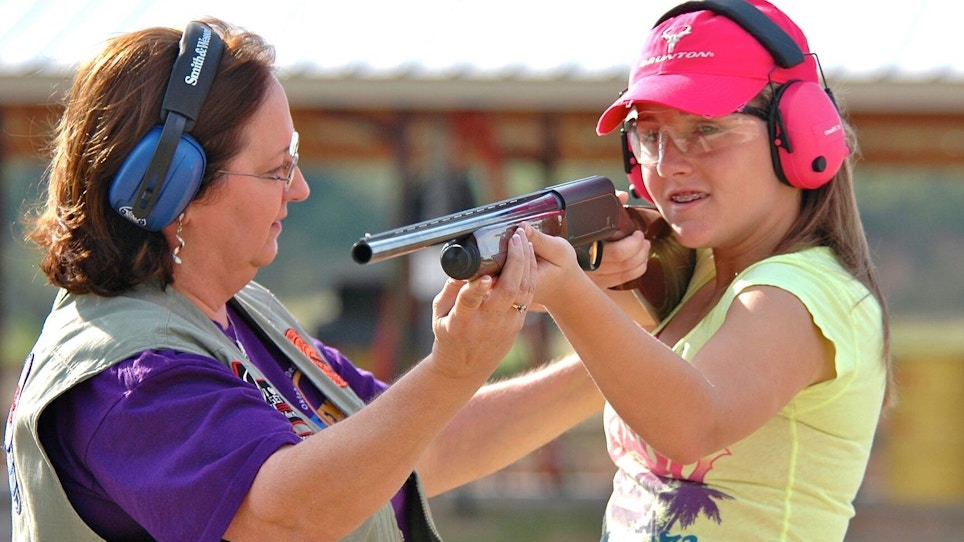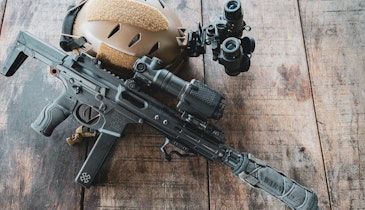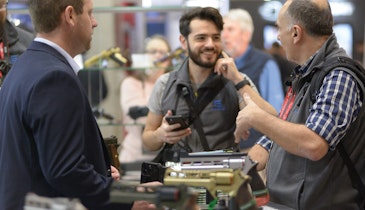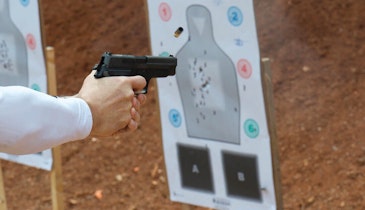Making sure young shooters have plenty of supportive, encouraging mentors who are instilling safety and shooting instruction is one way to get the most from your store, range, customers and instructors. (Photo: Ed Santos)
Your entire retail staff is responsible for the success of your training program —but the instructors, of course, are crucial. They must be more than good teachers — they're not just there to impart knowledge, but to support your store. A good firearms training instructor will also be skilled in selling, without sounding like a used-car salesman.
It's important to empower your instructors with the knowledge and training to answer questions about gear and accessories. Instructors should also have the ability to direct students to specific products and retail associates who have the best expertise in a particular category.
That being said, when it comes to hiring firearms training instructors, the question I am most often asked is should that instructor be an in-house staff hire or an individual hired as an independent contractor. My preference is in-house whenever possible. There are a number of reasons for this.
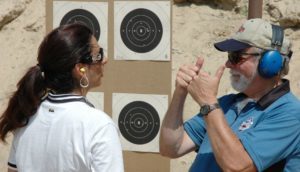
Contract and guest instructors will offer different presentations to shooters and can be a benefit to your store and range. (Photo: Ed Santos)
Contract Vs. Guest Instructors
Allow me to clarify the contract instructor term as discussed in this article. A contract instructor is someone who provides instruction on a regularly scheduled basis to clients of your facility. Do not confuse the term with that of a “guest instructor.” The guest instructor, is typically a well-known, nationally or internationally recognized instructor that you bring in from time to time to teach a specific program.
There are some very unique ways and specific times during the yearly retail cycle to bring in a guest instructor. We will discuss this in much detail in future articles.
Excitement = Success
The key factor in the success or failure and, ultimately, the speed at which a training program grows, is through creating a program in which every class provides an unexpected level of excitement for the student.
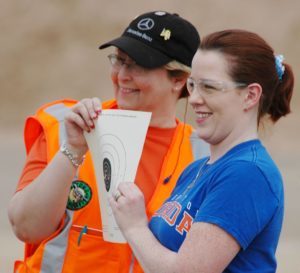
Positive results, encouragement and exitement always leave everyone with a good feeling and a desire to return for more instruction. (Photo: Ed Santos)
If a student takes a class from you and you provide a good training experience, at the end of the day you will have a satisfied customer. But that isn’t good enough. You can’t stop there because students can get that same experience at most of your competitors. So, establishing a satisfied student should never be your priority goal. In fact, that satisfied student will never grow your program at the rate or depth I would suggest you need to create a profitable program.
What we are working towards is a student that isn’t merely satisfied, but excited at the end of class, a student who accomplished much more than they anticipated. That excited student will leave the class and want to share their excitement with anyone who will listen.A class of 20 students on a Sunday can result in a group of 20 singing your praises on Monday morning and even through the next week. A merely satisfied student won’t be doing this.
How do we create the excitement? Take this example from the owner of a very successful range and training operations:
An example of how we create excitement here at Center Target Sports is as follows: In our basic pistol class we guarantee every student will leave the class having shot a five-shot group at 18 feet that can be covered with a quarter. No, the student may not be able to repeat this level of accuracy the next day without our instructor’s guidance, but they are all able to accomplish this in class. That is where the excitement factor comes in. They expected to learn about all the typical things taught in a basic pistol class, the topics covered by all our competitors. But they never thought they would shoot to the one-hole group covered by a quarter. It is amazing to see their faces and experience their excitement when they exit the range.
You’re In Control
So, we must create the excitement, and to create the excitement you must have total control of the presentation and curriculum. How does this affect your hiring choice in instructors?
Whether the instructor is in-house or contract, in the minds of the student, you as the range owner/operator own the experience and, therefore, the reputation of your training program — good or bad. As I’ve said, my preference is for a staff-hired instructor. One of the reasons for this is that if you intend to create a level of excitement in your training classes that keeps your students coming back for more and spreading the word, then you can’t afford to have a contract instructor teach an independent class at your facility that isn’t up to par with the desired level of your training. You and your facility will always be associated with what is taught at your location regardless of who owns the curriculum.
It’s not just about whether an outside instructor is good or not, the truth is a contract instructor will never give you total control of the curriculum. They may say they do, but if you are not monitoring every class, you can never be too sure. It can be very difficult to motivate a contract instructor to support your retail sales or promote other training that they are not responsible for. Again, they will be about selling themselves, not you.
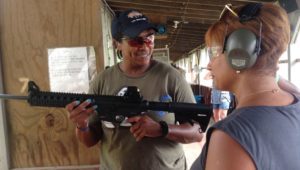
Customer loyalty overall increases as students have an opportunity to interact with the instructors when they are working the retail floor outside their classroom duties. (Photo: Ed Santos)
The Profit Margin Consideration
This is the main reason we have never allowed local instructors to teach independent classes at our facility. There are others — consider that a quality contract instructor will not work for less than 40 percent of the gross revenue they generate. That doesn’t sound bad, but in reality that arrangement will not result in you realizing 60 percent, as your administration of the training program alone will quickly reduce your share to about 50 percent — and why settle for a training margin around 50 percent when you should realize margins in excess of 90 percent?
Loyalty
Another element to think about when making this in-house or contract decision is the relationship between the instructor and your students. A contract instructor will develop student loyalty to their teaching, not to your business. If a contract instructor leaves your facility for another, most students will follow the instructor.
Another positive aspect of the in-house instructor is the increased exposure to the students outside the classroom. Customer loyalty overall increases as students have an opportunity to interact with the instructors when they are working the retail floor outside their classroom duties.
Loyalty is also important between you and the instructor. If the instructor is your employee and you participate in their continued education, for example, that relationship grows. And as that relationship grows, the possibility of the instructor going to your competition diminishes.
Summary
A training program is just one of a few of the issues I deal with on a daily basis when looking at the profitability of a commercial range. But over the last few years, a number of cash flow-troubled commercial ranges that have evaluated and restructured their training programs have seen dramatic improvements to their bottom lines. If you’re looking for ways to improve your margins, increase your customer flow and keep your customers as active, enthusiastic shooters, then reviewing and or modifying your training program will almost surely result in an improved bottom line for you.
None of this, of course, is without effort. However, there isn’t any other area in your day-to-day operations as range owners and operators that will offer such a dynamic increase in margin and, ultimately, your overall profitability.
I’ll be examining more about firearms training programs in future articles, as well as other topics that affect today’s firearms ranges. In my next column, I’ll take up the discussion of curriculum development in support of your identified niche as an independent retailer.
I will also offer some advice on how the curriculum we create elements that create excitement, as discussed earlier. Until then, should you have any questions about your range, visit www.nssf.org and click on the Ranges heading at the top of the page. There you’ll find a number of resources, including information on NSSF’s Range Action Specialist Team, its Star-Rating Range Program and more.
